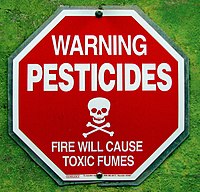
Photo from wikipedia
Neonicotinoid pesticides (NPs) are neurotoxic substances. They are highly effective as insecticides owing to their water solubility, permeability, and long-lasting activity. These molecules are structurally similar to nicotine and act… Click to show full abstract
Neonicotinoid pesticides (NPs) are neurotoxic substances. They are highly effective as insecticides owing to their water solubility, permeability, and long-lasting activity. These molecules are structurally similar to nicotine and act as nicotinic acetylcholine receptor agonists. The administration of NPs to experimental animals reportedly causes neuromuscular and reproductive disorders. Moreover, recently reported problems caused by NPs include damage to land-dwelling creatures (such as mammals and birds), hydrobiology, and ecosystems. This review summarizes the recent reports on NP concentrations detected in river systems in several Japanese regions. These values were lower than the environmental standard values; however, seasonal variations were observed. Furthermore, reports on NP-induced testicular and ovarian toxicity were examined, revealing that the mechanism of injury is mainly driven by oxidative stress. The use of NPs is declining worldwide, except in Japan; therefore, continuous monitoring remains necessary.
Journal Title: International Journal of Molecular Sciences
Year Published: 2022
Link to full text (if available)
Share on Social Media: Sign Up to like & get
recommendations!